Steractural Equation Modelling of Empowerment of Employees According to Knowledge Leadership and Knowledge Management in Sport Management
Rasool Nazari*
Associate Professor, Faculty of Sport Sciences, Islamic Azad University, Isfahan (Khorasgan) Branch, Isfahan, Iran
Submission: April 04, 2018; Published: April 24, 2018
*Corresponding author: Rasool Nazari, Associate Professor, Faculty of Sport Sciences, Islamic Azad University, Isfahan (Khorasgan) Branch, Isfahan, Iran; Tel: (00)989133680240; Email: nazarirasool@yahoo.com
How to cite this article: Rasool N. Steractural Equation Modelling of Empowerment of Employees According to Knowledge Leadership and Knowledge Management in Sport Management. J Phy Fit Treatment & Sports. 2018; 3(3): 555613. DOI: 10.19080/JPFMTS.2018.03.555613
Abstract
The purpose of this study is to analyse the prediction of empowerment of employees based on knowledge leadership and knowledge management approaches among managers of sport organisations. A survey was conducted among 170 employees working for sport organisations in the Isfahan Province, who were selected by means of stratified random sampling according to the Cochran formula. The measurement tools included three questionnaires, namely Reta and Vetala Knowledge Leadership, Spreitzer Employee Empowerment and Hemmati Knowledge Management. Face and content validity of the questionnaires were established. The reliability of the questionnaires obtained 96%, 84% and 86% respectively using the test-retest procedure and Cronbach's alpha coefficient. Both descriptive and inferential statistics were applied in the analysis. The results revealed that knowledge leadership accounts for 41% of the variance of employee empowerment and dimensions of knowledge management determined 21% of the variance. It was concluded that the focus of sport executives on components of knowledge management, such as tendency to learning, and knowledge leadership, including sharing and application of knowledge, leads to the empowerment of employees.
Keywords: Organisational empowerment; Knowledge leadership; Organisations; Employees; Knowledge management
Introduction
One ofthe most important challenges oftoday's organisational managers is insufficient use of intellectual resources, mental ability and potential capacities of human resources [1]. Most organisations do not use the capabilities of the staff optimally and managers are not able to apply their potential capacities.Although people could exhibit more creativity, initiative and activity in an organisational environment, for some reason, these capabilities are not utilised adequately [2]. Scholars in the field of change management and organisation development have introduced empowering human resources as an effective strategy in operating and developing human resources. They believe that empowerment of human resources is one of the modern incentives that should be used by organisations today. In fact, it is the response to meet the critical needs of modern management [3].
Humborstad, Kuvaas [4] suggest that leadership theories and research have a long history, but recently attention has shifted to the role of leadership in knowledge management. Organisational leaders can have an effective role in the processes of knowledge transfer. Also Birasnav [5] state that managers are not afraid of rapid changes; in fact, they have attended learning programmes and learnt that effective management means not only having more knowledge, but it is having the knowledge of how to use it.
Knowledge leadership plays a significant role in promoting organisational knowledge, organisational performance, organisational effectiveness, organisational learning, organisational culture, providing insights and information, and knowledge management. Leadership, contrary to the influence the behaviour of employees, inspiration and improving human relations, is considered as a stimulus for the relationship between the components of the management of intellectual capital [6]. According to Ugboro, Obeng [7], knowledge leadership is any attitude or action (group or individual; objective and implicit), which stimulates new and important knowledge by creating, sharing and using it in ways that will ultimately lead to collective thinking and consequences.
Different indicators, such as culture, structure, technology, management style and organisational learning, are effective in knowledge transfer in organisations. Rapp [8] argues that in order to understand the relationship between leadership and knowledge the assumptions and information of leaders and subordinates should be considered. Knowledge management is the process of collecting, creating and using the expertise of the members of the organisation. This would entail the process of creating, disseminating, promoting and applying knowledge in line with the goals, objectives and activities of the organisation, and exploiting intellectual capital that would lead to increasing productivity, creating new value and enhancing the capabilities of competitiveness.
Liao [9] argue that knowledge management emphasises value creation, which implies that existing knowledge is the managed by turning it into useful knowledge in the organisation. This involves two major components, namely managing of knowledge and increasing the ability to create new knowledge and innovation, which leads to appreciation of the importance of learning. In addition, the requirements and functional considerations in the knowledge management involve the leadership, training, organising and technology. At least two of these four elements directly associated with the empowerment of organisation's human capital are leadership and training. Knowledge management is explicit control over knowledge within the organisation that aims to achieve the organisation's goals. It involves the four activities of the creation of new knowledge, preservation of existing and new knowledge, distribution of knowledge and combination of existing knowledge [10].
According to Chow [11], empowering by creating the necessary infrastructures allows organisational knowledge to grow simultaneously and systematically. This not only contributes to the production of knowledge in the organisation, but also serves to motivate the group members to share their knowledge and experiences with one another. Spreitzer [12] argues that empowerment means that employees understand their tasks well before telling them what to do. Therefore, the main components that contribute to empowerment of employees include meaning, impact, competency and independence. Empowerment means the injection of power in employees and thus the organisation should strengthen the sense of personal power of employees. When managers are able to develop the dimensions of cognitive empowerment in others, they can empower them successfully [13].
In this regard, Zimmerman [14] contends that the practices of empowerment, which leads to greater satisfaction and commitment, does not necessarily lead to better performance of the employees, because effective empowerment needs to develop knowledge through management. Hancer, George [15] believe that the level of knowledge and awareness of employees could affect their empowerment. According to Niehoff [16], components of meaning and competency from job empowerment, components of information and knowledge acquirement through the opportunity afforded for organisational empowerment and innovative behaviour are predictors of job productivity, because the mentioned factors will increase the level of skills and abilities of employees. Dickson, Lorenz [17] reported that two cognitions of job empowerment, meaning and impact, have a positive and significant relationship with the job satisfaction of part-time or non-standard physical education teachers. Therefore, it is contended that making provision for the development of knowledge and skills through education and increasing information for staff members could lead to job empowerment.
Sport organisations are the main sport authorities. The variables knowledge leadership, knowledge management and employee empowerment need to be investigated and studied as it relates to these organisations. Appropriate interactions between knowledge leadership and knowledge management will lead to organisational empowerment, also in sport organisations. However, changes and informed responses to environmental changes should be based on a specific model and pattern. The use of empowerment in sport organisations and the encouragement of employees to update their knowledge base through interacting with people with particular expertise and skill could be appropriate ways to develop and expand these organisations.
The relationship between knowledge leadership and knowledge management with employee empowerment in mind for those working in sport organisations in the Isfahan Province is the main subject of this research. A leadership qualities approach, behavioural approach, contingency approach, charismatic and transformational approaches are among the many possible leadership approaches that can be pursued. Leadership, knowledge, culture and learning are among the elements of knowledge leadership and their role in organisational empowerment will be investigated.
In this study, attention will be given to the following questions, Which are the different aspects of knowledge leadership and knowledge management that could predict the empowerment of employees working in a sport organisation?; If so, considering the different aspects of knowledge leadership, is it possible to find better ways to achieve organisational empowerment of employees? The findings of this research could be of value to the planners who wish to increase the productivity of managers, to achieve employees' empowerment and to prevent financial losses for the organisation. Thus, the basic problems of sport organisations could be removed and a high ability of employees would be developed in line with the objectives of the organisation.
Methodology
In this study, attention will be given to the following questions, Which are the different aspects of knowledge leadership and knowledge management that coulThe present research is a correlation survey study. Data collection was done by means of field research and questionnaires.
Subjects
The research population consisted of employees working for sport organisations in Isfahan Province and the final research sample was selected through stratified (regions) random sampling according to the Cochran method with permissible error (5%). The original group provided for this research consisted of 306 employees, where the selection was based on the information obtained from the staff departments of the various organisations and their affiliated units. The final sample consisted of 170 employees, consisting of 90 (53%) males and 80 (47%) females, who were selected proportionately to be representative of each region in the Isfahan province. Biographic information of the subjects was confined to gender and level of education and was collected during the initial testing of the subjects.
Measurement Tools
Three questionnaires, namely Reta and Vetala Knowledge Leadership [18], Spreitzer Employee Empowerment [12] and Hemmati Knowledge Management were administered. A further questionnaire was used to collect demographic information. In order to verify the face and content validity of the questionnaires, preliminary questionnaires were prepared. Ten professors in the field of sport management were requested to assess the questions and do a content analysis. Based on the assessments provided by the experts, corrections and changes were made and the questionnaires was finalised. To determine the reliability of the measurement tools a test-retest procedure was followed. The retest, two weeks later involved 30 subjects who had been tested initially. The initial scores were compared with the retrial scores and reliability computed using Cronbach's alpha.
Reta and Vetala Knowledge Leadership: This questionnaire addresses the three components of learning tendency, supportive learning environment and support for the individual and group learning process and consists of 26 questions. The responses were based on the application of a five-point Likert Scale. The reliability for this instrument was (0.96) based on the Cronbach's alpha.
Spreitzer Employee Empowerment: The standard questionnaire of Spreitzer Employee Empowerment [12] consists of 20 items and covers four components, namely meaning, competency, independence and impact. The reliability was calculated to be (0.84) based on Cronbach's alpha. In a study on organisational empowerment by Asprytzr 1995, a reliability of 84% was reported.
Hemmati Knowledge Management: This questionnaire was developed through the investigation of a variety of previous studies related to knowledge management. The four dimensions of knowledge that was measured are knowledge creation, knowledge sharing, knowledge application and knowledge storage. The five-point Likert scale was applied for the responses. The reliability obtained for the knowledge management questionnaire was (0.86).
Data Analysis
The data was analysed both descriptively and inferentially. For the statistical analysis, the SPSS package was used. Kolmogorov- Smirnov test, Levin test, regression and single-sample t-test were used. A confidence level of 95% was selected. For the purpose of using inferential statistics, the Kolmogorov-Smirnov Test for normality of the sample and the Levin test for homogeneity of variance were used initially, before examining the research hypotheses. Cronbach's alpha was applied for determining the reliability of the tests. Univariate and multivariate correlations were applied to compare the actual scores with the ideal scores determined by multivariate regression. The t-test served to compare the study variables based on personal characteristics, namely gender. To compare the gender groups regarding the level of education, the Analysis of variance (F) with the Tukey test was applied.
Findings
According to the obtained results of descriptive statistics on gender and education level, the most observed frequency 90 (53%) were males (M) and the remaining 80 (47%) were females (F). The educational level represented by the subjects was: 52% BA-degree (F=108); 28% MS-degree (F=58); 15% Upper Diploma -degree (F=31) and finally Diploma 5% (F=10). Based on the obtained results from Kolmogorov-Smirnov Test and the Levin test, the sample follows a normal distribution for each test variable and the variables display homogeneity of variance.
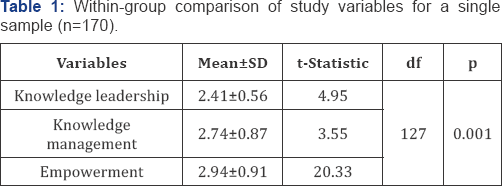
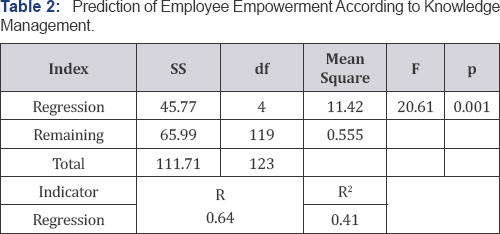
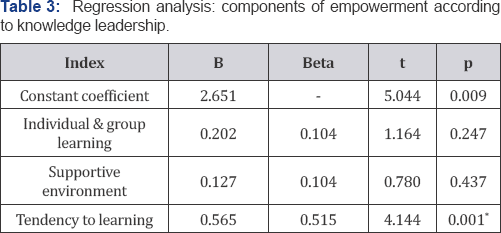
Considering the average values in Table 1, it is clear that in the mentioned organisations, the Knowledge Leadership, Knowledge Management and Empowerment of employees are significantly lower than the average level and there is a significant difference between the current situation and the optimal level. The obtained results of significance level in Table 2 suggest that knowledge leadership and employee empowerment is significant at the level of 5%. The results of Variance Analysis and statistical characteristics of regression between dimensions of knowledge leadership and employee empowerment show that the leadership dimensions determine about 41% of the variance associated with empowerment. The analysis of the enter method regression is shown in Table 3. Considering the obtained significance level, it is possible to use the tendency to learning for prediction. This information can be used to provide the model for empowerment's prediction according to knowledge leadership components.
Empowerment = 2.651 + 0.565 (tendency to learning)
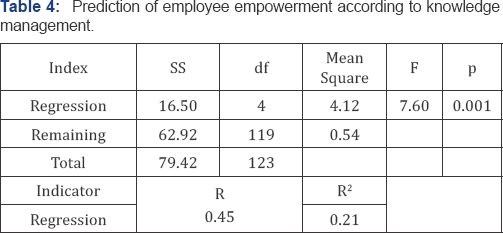
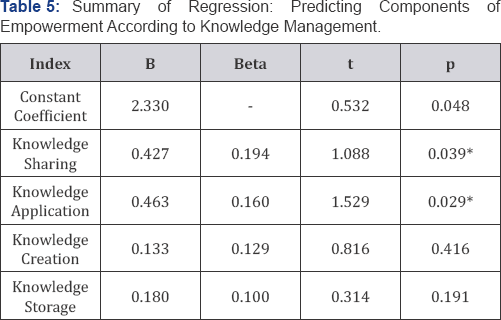
The obtained results of significance level in Table 4 suggest that there is a significant relationship between the employee empowerment and knowledge management (5%). The results of Variance Analysis and statistical characteristics of regression between dimensions of knowledge management and employee empowerment show that the knowledge management dimensions determine 21% of the variance associated with empowerment. The results of the Analysis of Enter method regression is shown in Table 5. Considering the obtained significance level, it is possible to use knowledge sharing and knowledge application for the prediction the employee empowerment. The above information can be used to provide the model for predicting empowerment according to knowledge management components:
Empowerment = 2.33 + 0.427 (knowledge sharing) + 0.463 (knowledge application)
Discussion and Conclusion
According to the findings, the status of knowledge leadership, knowledge management and empowerment in the studied organisations are lower than the average level and there is a significant difference between the current situation and the optimal level. It means that the level of knowledge leadership and implementation of knowledge management is not at an acceptable level, whilst these did not apply for job empowerment of the employees working in the sport organisations in this study.
The results of the present study are partly in disagreement with the findings of Yang [19] who reported that the high level of knowledge leadership of managers does not create a competitive advantage for organisations. It is possible that this is due to a difference in interpretation of the knowledge leadership components for sport managers. The finding of Qanbari, Eskandari [1], who reported that the status of knowledge leadership and intellectual capital management in the Bu-Ali Sina University is above the average level, is also different to the findings of the current study. This may be primarily due to the different nature of missions conducted by sport organisations and universities. The university is a knowledge-based organisation, whereas a sport organisation is a syndicate with different executive functions. It seems that the poor perception of sport managers regarding the importance of knowledge leadership characteristics and, especially, creating a favourable and positive environment conducive to learning, are among the reasons for the low level of knowledge leadership in sport organisations in Isfahan Province. The most central aspects of knowledge management, learning orientation, creating a supportive environment conductive to learning, supporting the learning process at the individual and group level and the roles pattern are introduced as defaults for knowledge leadership.
The status of knowledge management of employees working in sport organisations of Isfahan Province is significantly lower than the average level. The results of the present study is partly inconsistent with that of the study of Qanbari, Eskandari [1] where it was found that transformational leadership has the potential to impact on the employee perceptions of human resources. This inconsistency could be due to difference in the dimensions of knowledge management in two different research environments. The findings show that the status of employee empowerment working in sport organisations in the Isfahan Province is significantly lower than the average level, which is partly consistent with the findings reported by Mughly [20] that empowerment of employees working in Tehran's Education Organisation is less than the average level. This is probably due to lack of motivation or desire among employees working in Sport and Education organisations.
According to the results in Table 2, there is a significant relationship between knowledge leadership and employee empowerment. The results of the variance analysis and statistical characteristics of regression between dimensions of knowledge leadership and employee empowerment show that the leadership dimensions determine 41% of the variance associated with empowerment. Out of the knowledge leadership components, the regression analysis revealed the tendency to learning as an affective component of employee empowerment. These results are to some extent consistent with the results of Nauman [21] who revealed that knowledge leadership has a relationship with empowerment and organisational effectiveness. Hence, knowledge leadership could lead to learning among employees and thus they would experience job empowerment, which would serve the mission of their organisation.
There is a significant relationship between employee empowerment and knowledge management (Table 4). The results of Variance Analysis and statistical characteristics of regression between dimensions of knowledge management and employee empowerment show that 21% of the variance associated with empowerment is determined by the knowledge management dimensions. Knowledge sharing and knowledge application in regression analysis can be used to predict employee empowerment. These results are in agreement with the findings of Rapp [8] who found that there is a direct relationship between the methods of knowledge management and organisational performance. These findings are also consistent with those of Abolgasemi [22] where a positive and significant relationship between the processes of knowledge management and empowerment mechanisms were reported.
In the study of Larsen, Olaisen [23], it was concluded that transformational leadership influences employee perceptions of human resources. Since the components of knowledge management, knowledge sharing and knowledge application play the greatest role in the prediction of employee empowerment, it seems that managers should pay particular attention to the approaches to knowledge management in the management processes thereby providing favourable conditions for growth, promotion and development of employees.
Conclusion
In general, it can be acknowledged that the attention paid to knowledge leadership characteristics, such as the inclination to learning within a supportive learning environment, where especially the support provided during individual and group learning is necessary. Particular attention should be paid to components of knowledge management, such as knowledge creation, knowledge storage and, in particular, knowledge sharing and knowledge application because they are important contributors to organisational empowerment. By means of the latter, the sense of meaning, competency, independence and impact are created in employees. The mentioned components could create a favourable environment conducive to learning, because they will result in creating a common perception among employees to enhance their cooperation and friendship, to improve their organisational commitment and responsibility to organisational development and to promote their abilities in line with the objectives of the organisation. Therefore, it is necessary for managers of sport organisations to concentrate on promoting knowledge leadership qualities, especially by creating an environment conducive to learning, so that a common and positive perception about learning is encouraged among employees to increase their skill and performance standards.
Recommendations
It can be recommended that sport organisations endeavour to design and implement an appropriate and effective system of knowledge management. This requires identifying key success factors and practical measures for the different stages of designing and implementing a knowledge management system. In addition, it would afford employees more freedom to provide a suitable basis for empowerment. By creating a favourable context and transparent and stable values, employees would be encouraged to pursue the processes of knowledge management actively, thus creating and applying knowledge as part of their daily work and making institutionalised organisational decisions. Managers of sport organisations should reduce the complexities of the decision-making processes by encouraging their employees to be more involved in decision-making and in the application of their capabilities.
References
- Ganbari S, Eskandari A (2012) Investigation of the relationship between leadership and management of intellectual capital. Journal of Public Administration 4(12): 89-112.
- Nazari R, Ehsani M, Ashraf Gangouei F, Ghasemi H (2013) Structural Equation Modeling of effect of communication skills on interpersonal communication and its role in the organizational effectiveness of sport managers in Iran. Journal of Sport Management 5(4): 67-82.
- Rahnavard F, Mohammadi A (2009) Identifying key success factors of knowledge management system in Tehran's College and Higher Education. Journal of Information Technology Management 1(3): 3752.
- Humborsta S, kuvaas B (2013) Mutuality in leader-subordinate empowerment expectation: Its impact on role ambiguity and intrinsic motivation. Leadership Quarterly 24(2): 363-377.
- Birasnav M, Albufaslasa M, Bader Y (2013) The role of transformational leadership and knowledge management processes on predicting product and process innovation: An empirical study developed in Kingdom of Bahrain. Review of Applied Management Studies 11(2): 64-75.
- Viitala R (2004) Towards knowledge leadership. Leadership and Organization Development Journal 25(5/6): 528-544.
- Ugboro I, Obenge K (2000) Top management leadership employee empowerment job satisfaction and customer satisfaction in TQM organizations an empirical study. Journal of Quality Management 5(3): 247-272.
- Rapp A, Ahmearne M, mathieu J, Schillewaert N (2006) The impact of knowledge and empowerment on working smart and working hard the moderating role of experience. International Journal of Research in Marketing 23(3): 279-290.
- Liao C, chuang SH, Pui Lai To (2011) How knowledge management mediates the relationship between environment and organizational structure. Journal of Business Research 64(7): 728-736.
- Nonaka I (1994) A dynamic theory of organizational knowledge creation. Organization Science 5(1): 14-37.
- Chow L, LTW, Sha Z, Hong J (2006) The impact of developmental experience, empowerment, and organizational support on catering service staff performance. International journal of hospitality management 25(3): 478-495.
- Spreitzer GM (1995) Psychological empowerment in the workplace Dimensions measurement and validation. Academy of Management Journal 38(5): 1442-1465.
- Dastgerdi M, Goudarzi M, Asadi H, Dastgerdi S (2010) Empowerment relationship with employees' learning working in Iran's physical education organization. Journal of sport management 7: 111-124.
- Zimmerman MA (2002) Taking aim on empowerment research: On the distinction between psychological and individual conceptions. American Journal of Community Psychology 18(1): 169-177.
- Hancer R, George T (2003) Psychological empowerment of nonsupervisory employees working in full-service restaurants. Hospitality Management 22(1): 3-16.
- Niehof BP, Moorman RH, Blakely G, Fuller J (2001) The influence of empowerment and job enrichment on employee loyalty in a downsizing environment. Group and Organization Management 26(1): 91-114.
- Dickson KE, Lorenz A (2009) Psychological empowerment and job satisfaction of temporary and part-time non-standard workers:A preliminary investigation. Journal of Behavioural and Applied Management 10(2): 166-191.
- Mogerni M, Ramezan M (2011) Organizational behaviors management. Industrial Management Institute of Iran, Teheran, Iran.
- Yang J (2010) Antecedents and consequences of knowledge sharing in international tourist hotels. International Journal of Hospitality Management 29(1): 42-52.
- Mughly A, Hassan Pour M, Hassan Pour A (2009) The relationship between empowerment and organizational commitment to education in the nineteen districts of the Tehran Education Organization. Journal of Public Administration 1(2): 119-132.
- Nauman S, Mansour Khan A, Ehsan N (2010) Patterns of empowerment and leadership style in project environment. International Journal of Project Management 28(7): 638-649.
- Abolgasemi M, Haji khaje Lu S, Ahmadi M (2011) The role of organizational empowerment mechanism in the establishment of knowledge management processes. Culture Strategy 12: 183-200.
- Larse TJ, Olaisen J (2013) Innovating strategically in information and knowledge management: Applications of Organizational behavior theory. International Journal of Information Management 33(5): 76477..






























